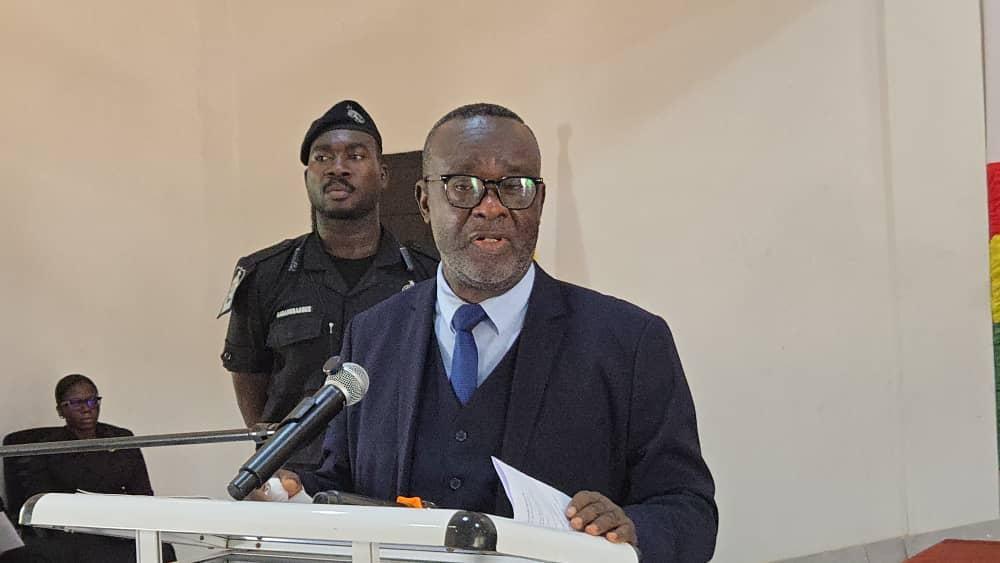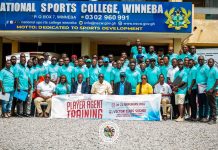Africa-Press – Ghana. The Chief Justice, Justice Paul Baffoe-Bonnie, has launched the nationwide Alternative Dispute Resolution (ADR) Week for the first term of the 2025/2026 Legal Year, with a call for stronger adoption of technology and innovation to expand access to justice.
This year’s celebration is on the theme: “Adoption of Innovation and Technology to Enhance Access to Justice Delivery through Alternative Dispute Resolution.”
Speaking at the ceremony in Ho on Monday, Justice Baffoe-Bonnie described the theme as timely and forward-looking, noting that justice delivery must evolve with global technological advancements.
Litigation, he said, remained slow, expensive, and adversarial for many Ghanaians, while ADR, through mediation, arbitration, conciliation, and negotiation, offers faster, less confrontational, and more cost-effective outcomes.
He highlighted ADR’s strengths in preserving relationships, supporting dialogue, and allowing creative, interest-based solutions that traditional court processes may not offer.
Over the last two decades, the Court-Connected ADR (CCADR) system has resolved more than 37,000 cases, significantly easing court congestion.
The Chief Justice said integrating technology into ADR would broaden access through virtual mediation, streamline processes through digital filing and automated scheduling, and enhance the overall user experience.
He assured that the Judicial Service is committed to building a modern digital ADR ecosystem through collaboration with mediators, judges, ICT professionals, and development partners.
Chief Justice Baffoe-Bonnie noted that ADR Week—observed once in each legal term, focused on mass mediation exercises and public sensitisation nationwide.
Agreements reached through mediation, he explained, were adopted as consent judgments with full legal backing.
He encouraged judges to identify suitable cases for ADR, registrars to uphold professional diligence, mediators to maintain integrity, lawyers to guide clients toward ADR, and the media to support public education.
Justice Angelina Mensah-Homiah, Judge-in-Charge of ADR, emphasised the need for operationalising the ADR Centres provided under Act 798.
These centres, she said, would allow citizens to access mediators and arbitrators without filing cases in court, further reducing caseloads.
She disclosed that about 400 mediators had recently been recruited and would soon be deployed nationwide.
She also noted the mandatory ADR provisions under the Land Act, which suspends court jurisdiction until ADR avenues are fully explored.
Mr. Moses Ayine Asampoa, Principal State Attorney and President of the Volta and Oti Bar Association, said ADR remained under-utilised despite existing legal frameworks.
He urged lawyers to promote ADR to clients, stressing that discouraging ADR for financial gain was a professional misconduct.
He encouraged the Bar to embrace digital ADR tools, virtual mediation, paperless processes, and innovation to support modern justice delivery.
Lawyer Godwin Kporble, Volta Regional Director of the Legal Aid Commission, highlighted ADR’s growing impact, citing national ADR caseload statistics that showed rising adoption.
He called for greater collaboration with social welfare departments, chiefs, and traditional leaders.
Mr. Christian Kpatsi, Regional Director of CHRAJ, reaffirmed the Commission’s commitment to mediation, noting that many cases that clog the courts could be settled early if ADR personnel and facilities were adequately provided.
Volta Regional Minister, Mr. James Gunu, stated that the government’s proposed 24-hour economy required an efficient justice system.
He underscored the role of digital ADR platforms, virtual hearings, case-management systems, AI-supported conflict screening, mobile ADR apps, e-signatures, and data analytics in modernising justice delivery.
He cautioned that digital reform must be accompanied by strong cybersecurity measures and public education to build trust.
The launch brought together Supreme Court Justices, High Court judges, Circuit and District Court judges from the Volta and Oti Regions, members of the Bar, Judicial Service staff, traditional authorities, students, and other dignitaries.
For More News And Analysis About Ghana Follow Africa-Press







